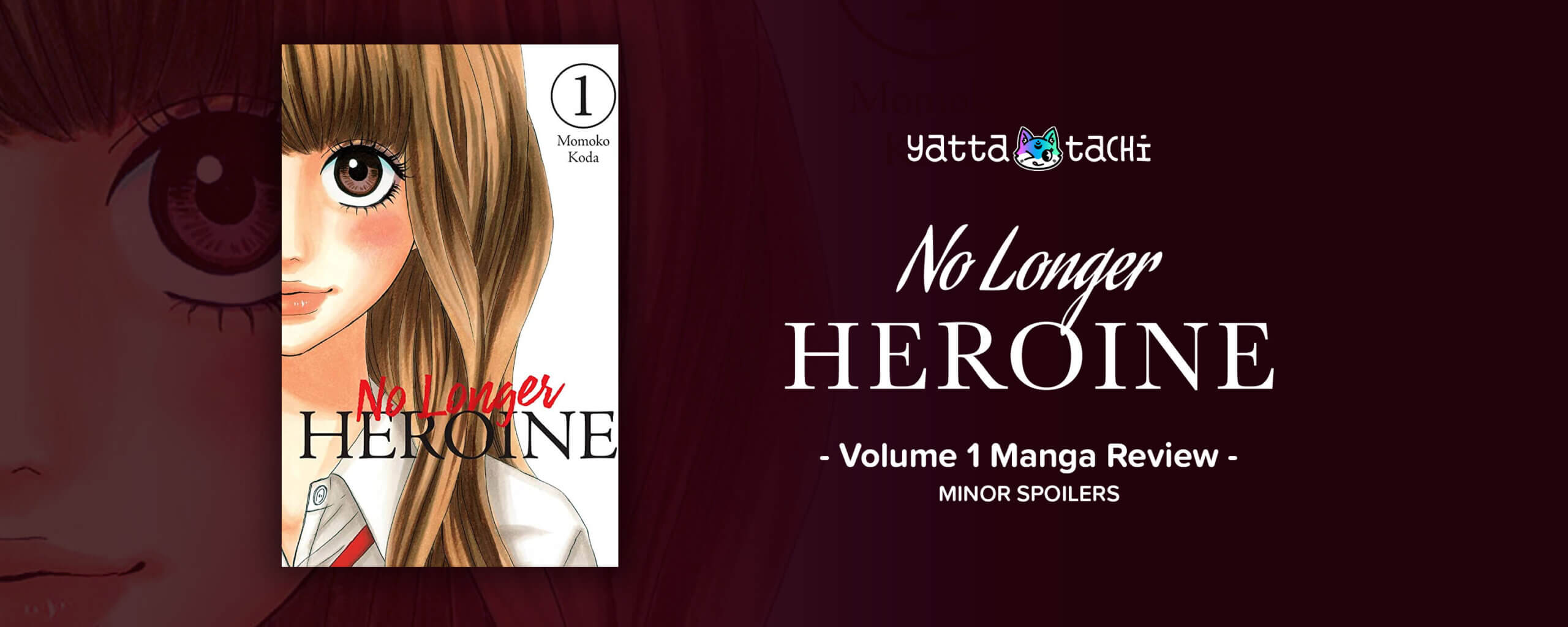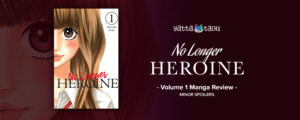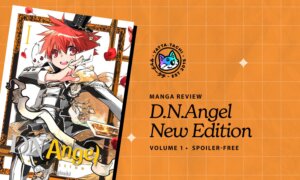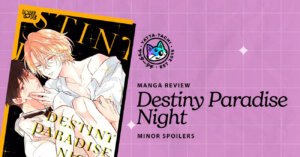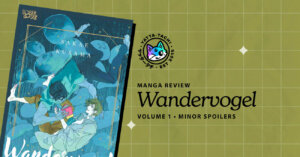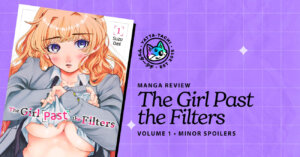Momoko Koda’s second published series, No Longer Heroine, is an absolute riot that any shojo fan will be able to relate to.
Hatori Matsuzaki has been in love with her childhood best friend, Rita Terasaka, for years. He’s known as a playboy around school, willing to go out with almost any girl that builds up the courage to ask. But despite what most would expect, he’s never serious about any of them, and his relationships consistently end within weeks of beginning. Hatori is aware of this, and she never feels threatened by any girl who approaches ‘her Rita’. She’s the heroine after all, and they always get the boy in the end.
Right?
When Adachi, a quiet and homely-looking girl, approaches Rita and confesses, Hatori doesn’t think much of it. She knows Rita never says no, and she expects this relationship to play out like all the rest. But she starts to notice key differences with Rita and Adachi’s interactions, and her hope that Rita will realize she’s the one for him starts to dwindle.
Hatori is the heroine, but Rita may not be her hero.
The Good
As a big fan of manga like Ao Haru Ride, Horimiya, Ouran High School Host Club, and others, I am a big fan of romantic comedies and dramas with more than a soft spot for the childhood best friend trope. No Longer Heroine takes the genre, as well as the common tropes, and upends the entire thing in the best of ways.
Hatori is such a fun character. Her love for and understanding of Rita is one that is easily relatable, whether it be in a real life situation or a form of media. The mangaka is able to show in both words and images how Hatori feels, what her actions mean to herself and the ones around her, and give some veracity to the whole thing. Who hasn’t had an unrequited crush? Who hasn’t daydreamed of a Disney-esque happily ever after? And who hasn’t experienced heartbreak over things not working out the way they planned? All of these things help to make Hatori feel real, which is something I don’t often experience with manga.
One of my favorite things about this volume is how many tropes the mangaka fits in, and how they twist them on their heads and show them from a perspective rarely seen before. Most series I’ve read only ever tell the story from the person who ‘gets the boy’, whether that turns out to be the childhood best friend or the newcomer/transfer student, and makes the character whose feelings go unrequited out to be the rival or villain. Ao Haru Ride would be a totally different story if it was told from Narumi’s point of view instead of Futaba’s, just like Fruits Basket wouldn’t be what it is today if told by Akito instead of Tohru. Readers might see Futaba and Tohru as the villains of the story, there to take away what Narumi and Akito had so desperately worked towards and fought for. No Longer Heroine takes this idea of perspective and shows the ‘what if’ of those examples. What if Narumi had been the main character? What if Tohru could be perceived as the villain? What if the main character doesn’t get their happily ever after? Having the POV be from the one who doesn’t become the love interest is a refreshing take, and one that works very well with the setting.
Beyond the story and plot, the title excels in so many other aspects. The art is wonderful and shows a wide array of emotions using a typical shojo style. There are hilarious panels depicting exaggerated expressions and genre-splicing scenes spread throughout for comedic effect, which reminded me a lot of Takane and Hana. There were more than a few scenes that pulled an actual laugh out of me.
All of the named characters are well developed with their own personalities and stakes. Though the majority of the volume focuses on Hatori, there are scenes with Rita, Adachi, and others spread throughout. These moments did a lot in terms of fleshing out the world and giving life to each character. With Hatori being the main character, it was especially important to see Adachi in a more neutral perspective to keep from seeing her as the villain in Hatori’s story. These scenes also helped with the pacing of the story as a whole. There was always something happening, actively or passively, and the flow from one to the next felt natural and smooth.
The Bad
There’s not much I can say against No Longer Heroine. Personally, I thought it was a 10/10, gold star, recommend-it-to-everyone kind of title. That being said, there are some aspects that some people may find distasteful due to sensibilities.
(Slight spoilers ahead.)
There are times that Hatori can come off like a bully. Her initial treatment of Adachi based on her looks, actions, and personality can be harsh at times, and Hatori’s desperation to win Rita over could be described as homewrecker-adjacent. All of this plays directly into the plot, though. Hatori IS the heroine of this story. She’s just not the heroine in the story she wishes she was in. And none of this is to say that Hatori doesn’t realize how she’s acting. In almost every situation where Hatori says or does something negative towards Adachi, she immediately follows it up with an apology. Hatori also does plenty of self-reflecting throughout the volume. This is not the sort of story that glamorizes mean girls. Instead, it shows someone reacting badly to something that has hurt them, recognizing it, and trying to do better. The bare bones of the plot seem to indicate that Hatori’s journey of self-discovery, acceptance, and growth despite her dreams being crushed is the entire point behind the title. Personally, I think the mangaka does a wonderful job of showing the varying emotions of a teenager in the grips of unrequited love, their thoughts and actions, and how those affect the people around them in an excellent and real way.
(End of spoilers.)
The Verdict
No Longer Heroine grabbed my attention in the first few pages and didn’t let go even after I closed the book. I adore Hatori as a protagonist. Her refreshing perspective as ‘the other girl’ is as intriguing as it is relatable. Each scene does a fantastic job of evoking some sort of emotion, whether it’s laughter or tears, anger or sympathy, jealousy or hope, or anything else. I would recommend No Longer Heroine to any shojo fan.
You can purchase No Longer Heroine Volume 1 at RightStuf, and Bookshop.
If you liked No Longer Heroine, you might like…
Credits
Story & Art: Momoko Koda
Translated by Alexandra McCullough-Garcia
Lettering by Rachel J. Pierce
Design: Liz Parlett
Editing: JuYoun Lee & Won Young Seo
Publisher: Yen Press
The Good
- Great art
- Well developed characters and plot
- Unique POV and interesting twists on popular tropes
The Bad
- Some readers may find MC’s actions distasteful
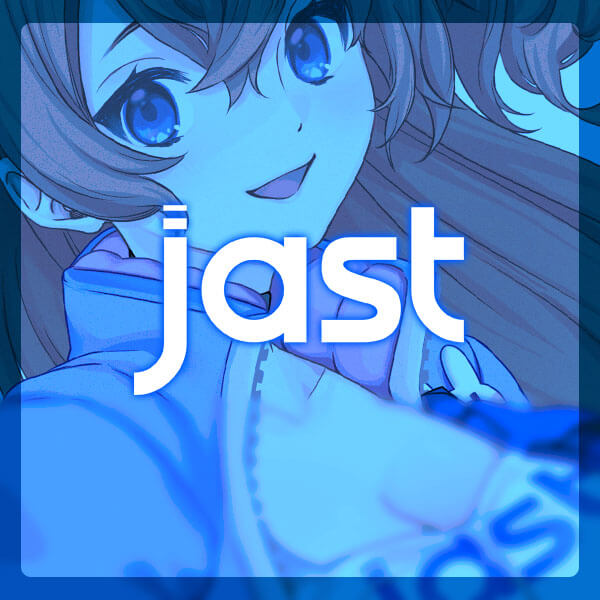
Featured Sponsor - JAST
The sweetest romance and the darkest corruption, the biggest titles and the indie darlings; for visual novels and eroge, there's nowhere better.
Big thank you to our supporters
From their continous support, we are able to pay our team for their time and hard work on the site.
We have a Thank-You page dedicated to those who help us continue the work that we’ve been doing.
See our thank you page